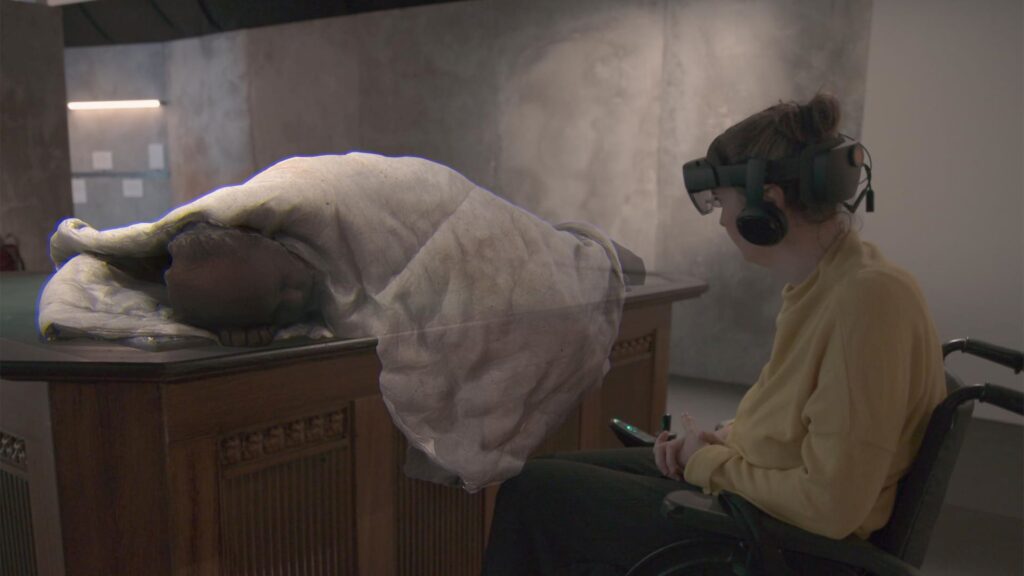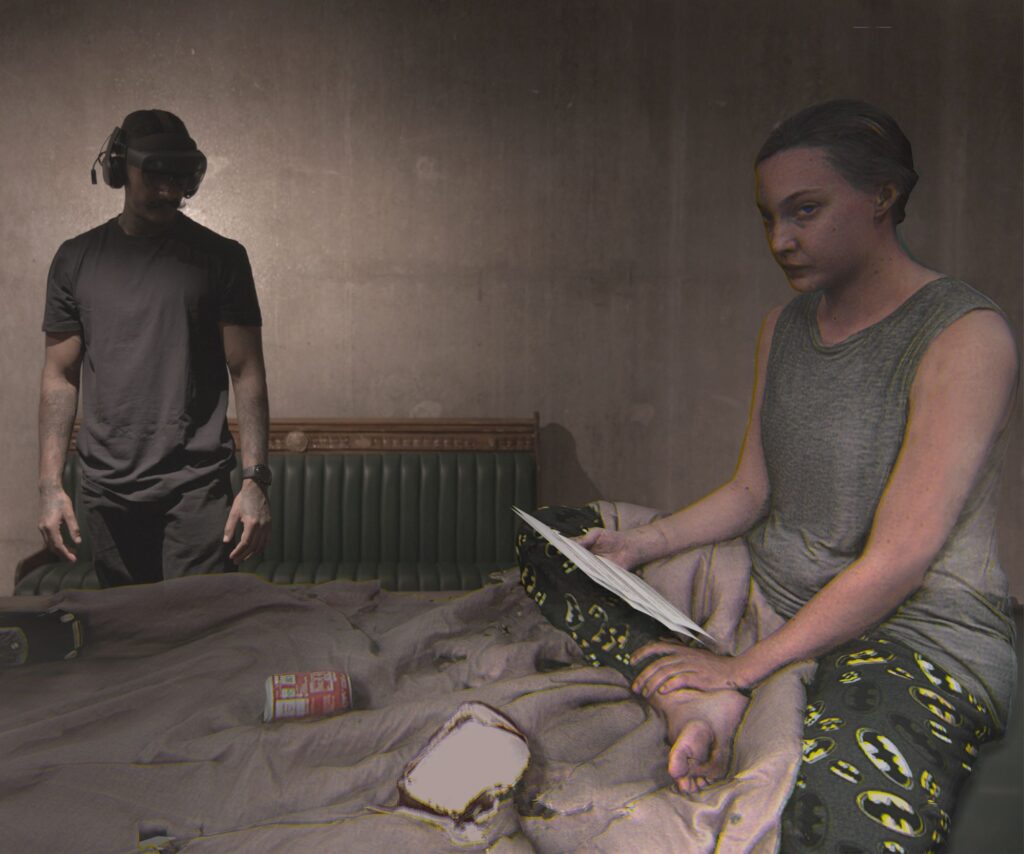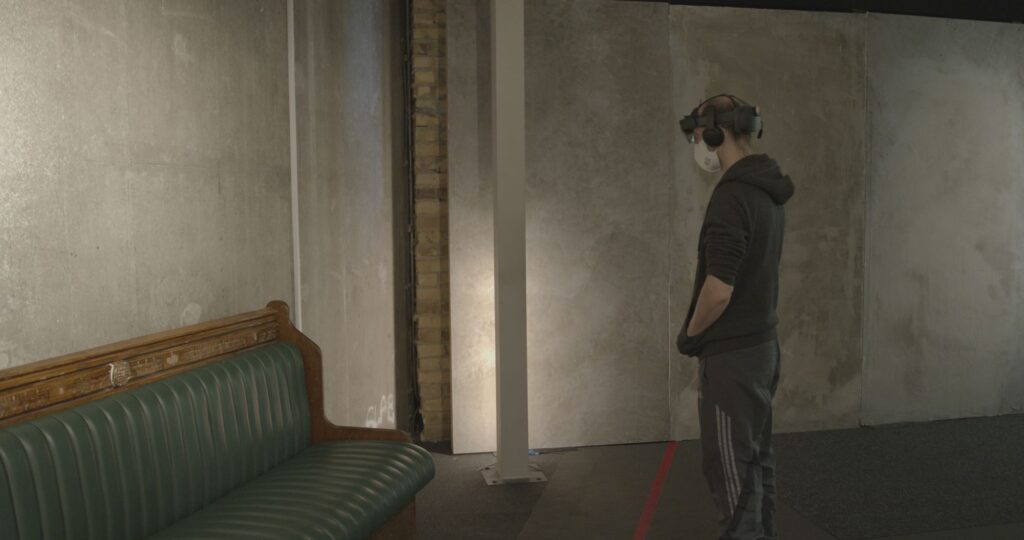
Museum of Austerity, coming to Newcastle after showings in London and Manchester, and after winning an international award, promises to leave audiences profoundly moved.
First, though, they might be scratching their heads.
It’s not a play, although the making of it did require actors; nor is it a film although it does involve moving images. It’s not even a museum in the conventional sense.
“I don’t think anyone’s done anything like this before,” says Sacha Wares, founder and director of Trial & Error Studio which developed the piece with the National Theatre’s immersive storytelling studio and English Touring Theatre.
She describes a room which you enter wearing a special headset.
“You go in and you see an empty space but maybe with a bed, a Job Centre table or a tiny bit of pavement where somebody fell and died.
“Then on top of these are holographic representations of deceased people played by actors. The headsets are very clever so as you walk up to each figure you’ll hear their story.
- Read more: Lifelong learning in a myriad of ways
- Read more: Night Classes a lesson in accessible theatre
“You’re completely free to walk around in whatever order you like but also to leave when you want because while some people are happy to stay for the duration, the stories are harrowing.”
There are eight in all, each related by someone who knew the deceased person well.
As you walk away, says Sacha, you will also hear real life audio of MPs in the House of Commons discussing the particular case or the relevant piece of welfare legislation.
“Tickets are timed for 45 minutes which gives you time to listen to maybe six out of the eight stories.
“That was deliberate. Our idea was that everybody leaves with a sense that there are many more stories of people who died due to changes in the benefits system as a result of austerity.”
It all began, says Sacha, when she gave birth in 2010 to her daughter, a child with “very complex medical needs”.
“Her life has spanned the austerity era and as a parent it’s been tremendously difficult battling for services and support and all the things she needs to be in education.

“When she was born people came to the house and said you’re going to need this or that, and it seemed there would be support. But year on year that support has disappeared.
“We’ve had to fight tooth and nail for her access to education. We’ve gone to tribunal twice. We’ve had first-hand experience of what it is to battle to get what every other child has by rights.
“It has given me insight into all the things people have struggled with under austerity.
“The people we’re telling stories about are adults who had been claiming different benefits such as Disability Living Allowance or PIP (Personal Independence Payment) or Job Seeker’s Allowance.
“What changed is the way they were assessed. All the stories told in the Museum of Austerity are about people who fell foul of new assessment processes.
“For example, Philippa Day. We tell the story of the very long struggle she had over her benefits claim.
“She took her own life in 2019 and died with a letter beside her from the Department of Work and Pensions (DWP) refusing her a home assessment even though she was diagnosed with all sorts of anxiety disorders.
“At the inquest the coroner said there had been 28 errors in the handling of her benefits application by the DWP and its agent, Capita.”
Capita later paid compensation to Philippa’s family. Her story you’ll hear told by her sister, Imogen.
Then there’s the equally tragic tale of Errol Graham, the Nottingham man with serious mental health issues who in 2018 was found starved to death by bailiffs who had come to evict him from his home.

His daughter-in-law, Alison Turner, provided the narrative for his terrible demise in a flat without heating or hot water.
Sacha started reading reports of links between changes to the benefits system and the deaths of disabled people, many of them written by John Pring, founder of Disability News Service, who for a decade has chronicled a mounting death toll.
“It’s horrific and almost unbelievable that this could happen in a civilised society in the 21st Century and that so many of the deaths have been almost invisible,” says Sacha.
In 2018 she contacted John to see if he would be interested in helping her and her company to bring some of the stories he had reported on to a wider and perhaps different audience.
That he is credited as special advisor and co-editor with Sacha of Museum of Austerity tells us that he said yes.

A theatre director by profession, Sacha admits it was some time before they settled on how best to present the stories.
Having co-directed an acclaimed verbatim theatre piece about prisoners at Guantanamo Bay, she toyed with that idea initially.
But instead she veered towards new technology, inviting the National Theatre’s immersive storytelling studio, founded to look at new ways of storytelling, to collaborate with her company which has a similar mission.
“For better or worse, virtual reality, mixed reality and AI (artificial intelligence) are coming and will probably flood our lives with adverts and things we haven’t chosen to see,” she says.
“What we’re trying to look at is how these technologies can be repurposed to tell human stories and bring you closer to them.”
One visitor to Museum of Austerity did indeed remark: “We have been looking at ghosts.”
“It’s horrific and almost unbelievable that this could happen in a civilised society in the 21st Century and that so many of the deaths have been almost invisible
Sacha Wares
The piece, developed through the pandemic, premiered at the London Film Festival in 2021 when families of those featured were given an exclusive viewing.
“What was really cheering was that they all met each other, many for the first time, and the feedback we had was that their loved ones had been given a dignity they didn’t have in the last years of their lives,” says Sacha.
“We’d taken care to do everything as sensitively as possible.”
Museum of Austerity went on to win the prize for best immersive production at the International Documentary Festival in Amsterdam and it comes to Live Theatre as only the third UK venue to host it.
- Read more: Review – The 39 Steps at Newcastle Theatre Royal
- Read more: Review – Underdog: The Other Other Bronte
Sacha advises that it’s a piece you have to be ready for and to have made a conscious choice to see it. The subject matter is tough.
But in order to make it truly accessible, every performance has the facility to be audio described or captioned and visitors can opt to have the audio customised, removing personally upsetting content perhaps relating to alcoholism or suicide.
John Pring says of the stories that they “bring home the awful truth of how so many disabled people were failed by our country’s social security system in their moments of greatest need, and of how politicians, senior civil servants and private sector contractors averted their eyes and let it happen again and again and again.”
Jack McNamara, Live Theatre’s artistic director, says: “There could not be a more crucial time for this work to be seen and for the lasting effects of austerity, particularly on disabled people, to be recognised and held to account.”
Museum of Austerity can be seen from April 17 to 21, with slots for up to eight people between 11.30am and 6.45pm.
For details and to book tickets go to the Live Theatre website.










